高中英语必修4Unit3语法PPT汇总
合集下载
高中英语新课标人教版必修四第三单元语法PPT课件
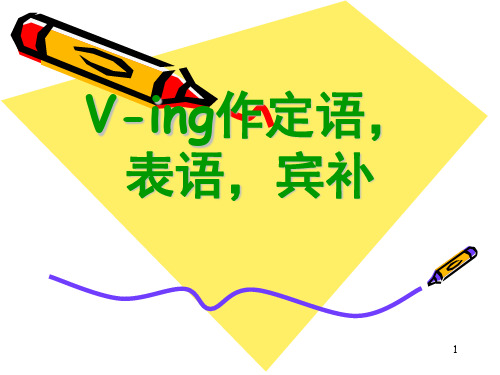
C. to hurry
D. hurried
6. Do you know the boy _______ under
the big tree?
A. lay
B. lain
C. laying
D. lying
16
8. There are lots of places of interest _______ in our city.
A. run
B. running
C. being run
D. to run
2. John’s bad habit is _____ without
thorough understanding.
A. read
B. being read
C. to be read
D. reading
14
7. I can hardly imagine Peter _______
A. needs repairing B. needing repaired C. needed repairing D. needing to be repaired
17
10. When we got back from the cinema, we found the lamp _______ but the door _______.
V-ing作定语, 表语,宾补
1
There is a writing desk in the room They lived in a room facing the street. My work is teaching English His words are encouraging. We heard her singing in her room.
最新人教版 英语 必修四 UNIT 3 语法讲课稿

2. Mr Smith, ______ of the ______ speech,
started to read a novel.
A. tired; boring
B. tiring; bored
C. tired; bored
D. tiring; boring
解析:此题考查现在分词与过去分词的区别。tired, moved, interested excited等过去分词叙述 的是人的本身感受;tiring, moving, interesting, exciting等现在分词叙述的是某 一物或事情给予人的感受。句意为“史密斯先生
chew
skin
bottom content astonish throughout particular failure
outstanding boil
Answer key for Exercise 2:
chew; astonished; contented; particular; failure; skin
bottom; throughout;
Noun
Adjective
enjoyment enjoyable
entertainme entertaining
nt
mouth
mouthful
help
helpful
Noun difficulty cruelty
honesty fortune
Adjective difficult
人教版 英语 必修四 UNIT 3 语法
Alternative words and expressions break down food using teeth outer covering of a body or plant the lower part or point of something be happy and satisfied with; not wanting more surprise greatly in every part of special, more than usual someone or something that is not successful extremely good when water is hot enough to turn into gas
人教版高中英语必修4-Unit3精品复习课件(1)

名师一线讲坛
1.完成句子 (1)I like the style of his writing __b_u_t _I _do_n_’_t _lik_e__th_e__co_n_t_e_n_ts_(但不喜欢其内容). (2)As he had to drive home after the party, _h_e_c_o_n_t_en_t_e_d_h_i_m_s_e_lf_w_i_th__tw_o__g_la_s_s_e_s_o_f_b_e_e_r_____ (所以他只喝了两杯啤酒就算了).
名师一线讲坛
(2)content sb.with sth.某人满意某事 a contented smile惬意的微笑 (3)to one’s heart’s content 尽情地 【注意】 (1)content 用作名词,作 “(书的)目录’内容”讲时,往往用其复数 形式contents。 (2)content用作形容词,作“愿意的” 讲时表示“非常愿意”往往用well修饰 content,而不用very。
名师一线讲坛
6. particular adj. 特殊的,特别的,挑 剔的 n.细节,细目
be particular about/over sth.对……讲 究,挑剔
in particular尤其,特别,格外
名师一线讲坛
比较网站
especially,specially particularly (1)especially指某事超乎一般的重要, 强调“超过其他”;常用于一些强调需要 得到特别注意或特别待遇的场合,含有对 比的意味。
名师一线讲坛
2.完成句子 (1)That he passed the English test __a_s_to_n_is_h_e_d_e_v_e_r_y_o_n_e___(使每个人都感到惊 讶). (2)___T_h_ey__w_e_r_e_a_ll_a_s_to_n_i_s_h_e_d_ (他们全都 很惊讶)to hear China won 51 gold medals in the Beijing Olympics.
人教高中英语必修4Unit3Words and Expressions课件 (共46张PPT)
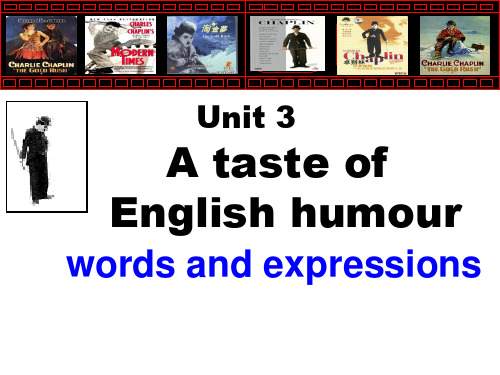
situation语境记忆法
badly off
1. When I was a child, our family was so badly
off that we couldn't have meat for dinner aBt the
Spring Festival.
2.The mountain village was then badly off for
as if he was ______from the outside world.
A. cut out
B. cut off
C. cut up
D. cut down
拓展
cut down 砍倒;削减,缩短; cut in 插嘴;突然插入 cut into 切成两半/切碎 cut out 切掉;删掉 cut up 切碎,切掉;使丧气,使痛
Unit 3
A taste of English humour
words and expressions
Learning aims
1. Read the new words fluently. 2. Use different ways to learn the
new words and expressions 3. Use the important words
拓展:director n 导演 directly adv直接的 direction n 方向
学以致用
用direct的适当形式填空:
1.He didn't give me __d_ir_e_c_t____answer.
2.Can you tell me_d__ir_e_c_tl_y_ whether he will help us? 3.Under the _d_i_re_c_t_i_o_n_ of our teachers, we have succeeded in designing the new campus.
人教高中英语必修4Unit3Grammar课件 (共29张PPT)
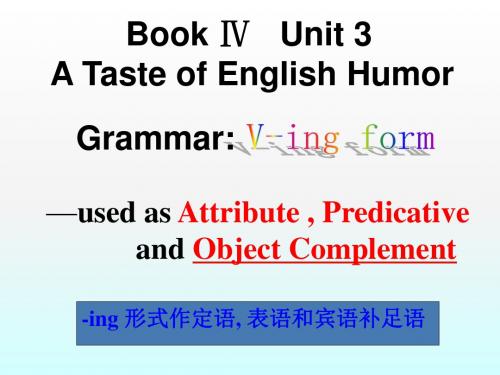
2) –ing用来表示主语所具有的特征,如: His concern for his mother is most touching.
他对母亲的关爱很感人。
His words are encouraging. 他的话很鼓舞人。
3、-ing形式作宾语补足语 1) 动词-ing形式作宾语补足语常放在宾语后面,表示 一个正在进行的主动性的动作,强调一个正在进行 的动作或一种状态。如: 当我们回到学校时, 发现一个陌生人站在大门口。
2) Such training was common in acting families at this time.
3) Charlie spent his childhood (in) looking after his sick mother and his brother.
4) His subtle acting made everything entertaining.
A. tired; boring B. tiring; bored C. tired; bored D. tiring; boring
解析:此题考查现在分词与过去分词的区别。 tired, moved, interested excited等过去分词叙 述的是人的本身感受;tiring, moving, interesting, exciting等现在分词叙述的是某一 物或事情给予人的感受。句意为“史密斯先生 对这个令人厌烦的讲话感受厌倦了,所以开始 读起一本小说来”。
3.To enjoy some useful English expressions using -ing form.
-ing form
Discovering Useful Structures
人教版高中英语选择性必修第四册UNIT3 Learning About 课件PPT
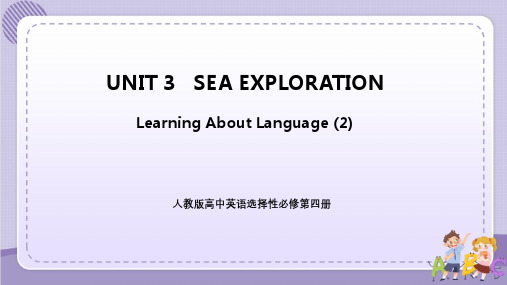
Activity 2
Join the words to make sentences using infinitives. Then decide the function of each infinitive.
EXAMPLE It is fun/visit an aquarium/in summer →It is fun to visit an aquarium in summer.(S)
3 A: Wow! I didn’t expect Pete __to__b_e___ (be) such a good swimmer!
B: _H__a_v_i_n_g__s_p_e_n_t__(spend) the past summer practising almost every day, he is now able __t_o__sw__i_m___ (swim)
2 A: Have you got the test result on the new medicine? B: Yes, it has proved _t_o__b_e______ (be) somewhat effective, but further testing remains _t_o__b_e__d_o_n__e (do).
3 Magellan/was the first person/sail around the world → Magellan was the first person to sail around the world.(Attr)
4 The UN peacekeeping force/aims/maintain peace and prevent armed conflicts → The UN peacekeeping force aims to maintain peace and prevent armed conflicts.(O)
人教新课标必修4 Unit 3 语法讲解课件.
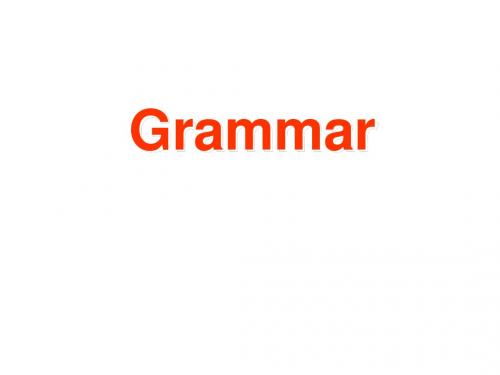
Verb
perform humour astonish bore
3
astonishment bore
2018年12月10日星期一
Noun charm entertainment
Verb charm entertain
2018年12月10日星期一
4
Adjective fortunate contented, content performing humorous astonishing bored, boring
-ing 形式作定语, 宾语补足语和表语的用法 一、-ing形式作定语
1. 单个动词的-ing形式作定语位于被修饰 名词的前面,既可以表示被修饰者的作用 或功能,也可以表示被修饰者的动作或状 态。如:
building materials = materials for building 建筑材料
2018年12月10日星期一 13
drinking water = water for drinking 饮用水 a walking stick = a stick for walking 手杖 a reading room = a room for reading 阅览室 a writing desk = a desk for writing 写字台
吸烟会致癌。
2018年12月10日星期一 10
3. Walking is my sole exercise.
散步是我唯一的运动。
4. Talking mends no holes.
(谚)空谈无济于事。
5. I suggest bringing the meeting to an end.
我建议结束会议。
2018年12月10日星期一
高中英语精品课件Unit3 Tomorrow’s world-Grammar and usage(译林牛津版必修4)

8. He told me the sports meeting would be held ____________(hold) the next month. 9. Rice ___________(grow) in the south of the is grown States.
We can use modal verbs in the passive voice to talk about ability, possibility, duty, permission, etc.
was given 1. I ___________(give) a new book by my father on my birthday. 2. English ___________(find) very useful. is found
3. The work will ______________(finish) tomorrow. be finished being watered 4. The flowers are ______________(water) by them now.
Practice:
1. The viewer can touch the objects in the film. The objects in the film can be touched. 2. The viewer may feel a real sense of achievement and happiness. A real sense of achievement and happiness may be felt. 3. RealCine might not impress some viewers. Some viewers might not be impressed by RealCine.
We can use modal verbs in the passive voice to talk about ability, possibility, duty, permission, etc.
was given 1. I ___________(give) a new book by my father on my birthday. 2. English ___________(find) very useful. is found
3. The work will ______________(finish) tomorrow. be finished being watered 4. The flowers are ______________(water) by them now.
Practice:
1. The viewer can touch the objects in the film. The objects in the film can be touched. 2. The viewer may feel a real sense of achievement and happiness. A real sense of achievement and happiness may be felt. 3. RealCine might not impress some viewers. Some viewers might not be impressed by RealCine.
- 1、下载文档前请自行甄别文档内容的完整性,平台不提供额外的编辑、内容补充、找答案等附加服务。
- 2、"仅部分预览"的文档,不可在线预览部分如存在完整性等问题,可反馈申请退款(可完整预览的文档不适用该条件!)。
- 3、如文档侵犯您的权益,请联系客服反馈,我们会尽快为您处理(人工客服工作时间:9:00-18:30)。
8
afraid of doing because they do not want to appear a social _fa_i_lu__re_. On one occasion in a restaurant he ordered a steak tartare. When the uncooked meat arrived he was o_v_e_r_c_o_m__e by shame because he could not eat it. He _c_u_t_o_f_f_ a piece of meat and pretended to _ch__ew_ a mouthful but instead put it into the plant pot beside him. He put other pieces into his pocket.
9
T_h_r_o_u_g_h_o_u__t the meal he seemed to show great _e_n_j_o_y_m_e_n_t_in his food. He was such an _o_u_t_st_a_n_d_i_n_g_ performer that when he finished eating his dinner, the waiter offered him the same dish again at on extra c_h_a_r_g_e_!
2) I’ll remember to post the letter. 我会记着去寄信的。
3) I shall never forget seeing the famous writer. 我__永__远___不__会__忘__记__见__到__过__那__位__著__名__ 作__家__。_
27
4) Don’t forget to write to your mother. 不__要__忘__了__给__你__母__亲__写__信__。_
5) 我真后悔没赶上那次报告会。 _I_r_e_g_r_et__m_i_s_si_n_g__th_e__r_ep__o_rt_.
6) 我遗憾地告诉你我不能接受你的建议。
___________________________
I__re_g_r_e_t_to say I can’t take your advice.
28
D. 在try,mean之后,意义各不相同, 如try to do (设法),try doing (试试), mean to do (打算,有意要做), mean doing (意思是,意味着)。如:
24
②既可接动名词又可接不定式作宾语的 动词,常见的有:begin,start, continue,like,love,prefer,by, mean,forget,remember,hate等。 A. 在like,love,hate,prefer等动词 之后,用-ing或不定式意义上没有什么 不同,只是侧重点有些不同,动名词 表示泛指的动作,不定式表示具体的 一次性动作。
2) 和夏洛克争辩是没有什么用的。 I_t_i_s_u_s_e_le_s_s_t_r_y_in_g__t_o_a_r_g_u_e_ with Shylock.
3) 想再解释一次有好处吗? I_s_i_t_a_n_y__g_o_o_d_t_r_y_in_g__t_o_e_x_p_l_a_in_?
4) 跟你在一起工作是令人愉快的。 _It_i_s_p_l_e_a_s_a_n_t_w_o_r_k_i_n_g__w_i_th__y_o_u_.__
20
There is no sense in doing 做……没有道理 There is/was no use doing 干……无意义 There is/was nothing worse than doing 没有比……更糟的 There is/was no point doing 干……无意义
Adverb fortunately contentedly
humorously astonishingly boringly
6
Adjective charming entertaining
Adverb
charmingly entertainingly
7
2. Answer key for Exercise 2. In the 1990s, Mr. Bean became a star
22
1) 我不能不去。 I can’t avoid going.
2) 你是否考虑过找一位挚友? Have you considered _lo_o_k_i_n_g__fo_r_ one special friend?
3) 我们必须设法避免犯同样的错误。 We must try to a_v_o_i_d__re_p_e_a_t_i_n_g the same mistake.
4) Your plan would mean spending hours. 你__的__计__划__意__味__着__要__花__费__几__个__小__时__。
30
E. go on doing 和 go on to do go on doing 继续做一直在做的事;go on to do 接着做另一件事。如:
_P_la_y_i_n_g_t_r_i_ck__s_o_n_o_t_h_e_r_s_ is something we should never do. 2) 学习新单词对我来说非常重要。
L__e_a_rn__in_g__n_e_w__w_o_r_d_sis very important for me.
10
一般式 完成式
主动形式 doing
having done
被动形式 being done having been done
11
Revision
-ing形式作主语和宾语的用法
Translate the following sentences into Chinese.
1. Talking to him is talking to a wall. 对他说话等于对牛弹琴。
3) 无法知道他什么时候离开。 There was __________ when he would leaven.o knowing
19
常用-ing形式作主语的句型有: It +be +a waste of time doing 做……是浪费时间的 It is/was no good/use doing 做……是没用处的 It is/was hardly/scarcely worth doing 做……不值得 It is/was worth/worthwhile doing 做……是值得的
using mime to highlight difficult social situations much as Charlie Chaplin had done. His method of acting was to appear _u_n_c_e_r_t_a_in_, look around and then do exactly the wrong thing. Children particularly would burst into l_a_u_g_h_t_e_r at his behavior. He always managed to _p_ic_k__o_u_t those things that people are
15
②用形式主语it,把真正的主语——动 名词结构移置句尾。但这种句子形式 有一定的限制,作表语的只能是某些 形容词或少数名词,如useful, useless,good,fun;no use,worth 等。如:
1) It’s worth making the effort. 这事值得去做。
16
25
B. 在begin/start,continue之后,用动 名词和不定式,意义无甚区别,尤 其是当主语是人的时候。
C. 在动词forget,remember,regret之 后,用动名词与不定式意义不同。 动名词表示动作先于谓语发生,不 定式表示后于谓语动作,如:
26
1) I remember posting the letter. 我记得我已把信寄了。
23
4) 晚饭后你想和我一起散步吗? Do you f_e_e_l_l_ik_e__h_a_v_in_g__a_w__a_lk_ with me after supper?
5)人们忍不住嘲笑那个愚蠢的人。 People _co_u__ld_n_’_t_h_e_l_p_l_a_u_g_h_i_n_g_a_t_t_h_a_t foolish man. 这类动词还有:excuse,fancy,give up,put off,risk等。
人教课标版 高一 必修 4 Unit 3
1
2
1. Look at the reading passage again to find words and expressions that mean the same.
3
Noun fortune contentment performer/ performance humour astonishment bore
2. Smoking may cause cancer. 吸烟会致癌。
12Biblioteka 3. Walking is my sole exercise. 散步是我唯一的运动。
4. Talking mends no holes. (谚)空谈无济于事。
5. I suggest bringing the meeting to an end. 我建议结束会议。
Verb
perform humour astonish bore
4
afraid of doing because they do not want to appear a social _fa_i_lu__re_. On one occasion in a restaurant he ordered a steak tartare. When the uncooked meat arrived he was o_v_e_r_c_o_m__e by shame because he could not eat it. He _c_u_t_o_f_f_ a piece of meat and pretended to _ch__ew_ a mouthful but instead put it into the plant pot beside him. He put other pieces into his pocket.
9
T_h_r_o_u_g_h_o_u__t the meal he seemed to show great _e_n_j_o_y_m_e_n_t_in his food. He was such an _o_u_t_st_a_n_d_i_n_g_ performer that when he finished eating his dinner, the waiter offered him the same dish again at on extra c_h_a_r_g_e_!
2) I’ll remember to post the letter. 我会记着去寄信的。
3) I shall never forget seeing the famous writer. 我__永__远___不__会__忘__记__见__到__过__那__位__著__名__ 作__家__。_
27
4) Don’t forget to write to your mother. 不__要__忘__了__给__你__母__亲__写__信__。_
5) 我真后悔没赶上那次报告会。 _I_r_e_g_r_et__m_i_s_si_n_g__th_e__r_ep__o_rt_.
6) 我遗憾地告诉你我不能接受你的建议。
___________________________
I__re_g_r_e_t_to say I can’t take your advice.
28
D. 在try,mean之后,意义各不相同, 如try to do (设法),try doing (试试), mean to do (打算,有意要做), mean doing (意思是,意味着)。如:
24
②既可接动名词又可接不定式作宾语的 动词,常见的有:begin,start, continue,like,love,prefer,by, mean,forget,remember,hate等。 A. 在like,love,hate,prefer等动词 之后,用-ing或不定式意义上没有什么 不同,只是侧重点有些不同,动名词 表示泛指的动作,不定式表示具体的 一次性动作。
2) 和夏洛克争辩是没有什么用的。 I_t_i_s_u_s_e_le_s_s_t_r_y_in_g__t_o_a_r_g_u_e_ with Shylock.
3) 想再解释一次有好处吗? I_s_i_t_a_n_y__g_o_o_d_t_r_y_in_g__t_o_e_x_p_l_a_in_?
4) 跟你在一起工作是令人愉快的。 _It_i_s_p_l_e_a_s_a_n_t_w_o_r_k_i_n_g__w_i_th__y_o_u_.__
20
There is no sense in doing 做……没有道理 There is/was no use doing 干……无意义 There is/was nothing worse than doing 没有比……更糟的 There is/was no point doing 干……无意义
Adverb fortunately contentedly
humorously astonishingly boringly
6
Adjective charming entertaining
Adverb
charmingly entertainingly
7
2. Answer key for Exercise 2. In the 1990s, Mr. Bean became a star
22
1) 我不能不去。 I can’t avoid going.
2) 你是否考虑过找一位挚友? Have you considered _lo_o_k_i_n_g__fo_r_ one special friend?
3) 我们必须设法避免犯同样的错误。 We must try to a_v_o_i_d__re_p_e_a_t_i_n_g the same mistake.
4) Your plan would mean spending hours. 你__的__计__划__意__味__着__要__花__费__几__个__小__时__。
30
E. go on doing 和 go on to do go on doing 继续做一直在做的事;go on to do 接着做另一件事。如:
_P_la_y_i_n_g_t_r_i_ck__s_o_n_o_t_h_e_r_s_ is something we should never do. 2) 学习新单词对我来说非常重要。
L__e_a_rn__in_g__n_e_w__w_o_r_d_sis very important for me.
10
一般式 完成式
主动形式 doing
having done
被动形式 being done having been done
11
Revision
-ing形式作主语和宾语的用法
Translate the following sentences into Chinese.
1. Talking to him is talking to a wall. 对他说话等于对牛弹琴。
3) 无法知道他什么时候离开。 There was __________ when he would leaven.o knowing
19
常用-ing形式作主语的句型有: It +be +a waste of time doing 做……是浪费时间的 It is/was no good/use doing 做……是没用处的 It is/was hardly/scarcely worth doing 做……不值得 It is/was worth/worthwhile doing 做……是值得的
using mime to highlight difficult social situations much as Charlie Chaplin had done. His method of acting was to appear _u_n_c_e_r_t_a_in_, look around and then do exactly the wrong thing. Children particularly would burst into l_a_u_g_h_t_e_r at his behavior. He always managed to _p_ic_k__o_u_t those things that people are
15
②用形式主语it,把真正的主语——动 名词结构移置句尾。但这种句子形式 有一定的限制,作表语的只能是某些 形容词或少数名词,如useful, useless,good,fun;no use,worth 等。如:
1) It’s worth making the effort. 这事值得去做。
16
25
B. 在begin/start,continue之后,用动 名词和不定式,意义无甚区别,尤 其是当主语是人的时候。
C. 在动词forget,remember,regret之 后,用动名词与不定式意义不同。 动名词表示动作先于谓语发生,不 定式表示后于谓语动作,如:
26
1) I remember posting the letter. 我记得我已把信寄了。
23
4) 晚饭后你想和我一起散步吗? Do you f_e_e_l_l_ik_e__h_a_v_in_g__a_w__a_lk_ with me after supper?
5)人们忍不住嘲笑那个愚蠢的人。 People _co_u__ld_n_’_t_h_e_l_p_l_a_u_g_h_i_n_g_a_t_t_h_a_t foolish man. 这类动词还有:excuse,fancy,give up,put off,risk等。
人教课标版 高一 必修 4 Unit 3
1
2
1. Look at the reading passage again to find words and expressions that mean the same.
3
Noun fortune contentment performer/ performance humour astonishment bore
2. Smoking may cause cancer. 吸烟会致癌。
12Biblioteka 3. Walking is my sole exercise. 散步是我唯一的运动。
4. Talking mends no holes. (谚)空谈无济于事。
5. I suggest bringing the meeting to an end. 我建议结束会议。
Verb
perform humour astonish bore
4
